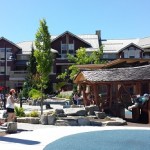 We pay millions of dollars every year to travel to cities and resorts that offer us a highly attractive “experience” of a place. Given the emotional and financial power of our desire for a memorable and desirable experience, why is there not a “science of experience” whose cornerstones are the start of every planning or development project?
We pay millions of dollars every year to travel to cities and resorts that offer us a highly attractive “experience” of a place. Given the emotional and financial power of our desire for a memorable and desirable experience, why is there not a “science of experience” whose cornerstones are the start of every planning or development project?
Isn’t it interesting that we engineer our cities to offer very little of what we most desire in our lives – great experiences?
In the late 20th century, the highly successful company Intrawest developed some of the world’s most successful resorts – and the core approach they brought they called “experience-driven development.” They would spend days and weeks, with a wide range of individuals including visionary creative writers and storytellers, working through the details of the experience they wanted their visitors to have – and then build what they envisioned. While I don’t want to live in a resort, I think that regardless of how successful any particular part of any of their resorts was, the experience they offer is a far site better than most of the urban spaces we live in.
I believe we can learn some big lessons from the Intrawest approach in how we plan and design developments in our cities. It doesn’t need to look like a resort – it can be authentically any type of urban area we want – but any space can offer interesting and desirable experiences.
We need to develop the art and science of “experience-driven planning.”
To develop this approach, we’ll first need to create a framework of both the kinds of experiences we want to have in various urban areas and then the elements of urban form that best provide those experiences. We’ll then need to figure out how to best deliver that form and those experiences in an affordable manner, including how to carefully create planning guidelines to ensure all private development delivers a reasonable standard of these without unduly limiting creativity and innovation.
To create this, we’ll all have to work together – it’s a big question. We can each individually start by considering our favourite urban places, what the good experiences are that we have there, and then how the spaces deliver those experiences in how they’re designed and operated. Over time with a robust discussion, I believe we could begin to build a new “experience-driven” approach to how we plan our developments and cities that will make our new cities even more desirable than the beautiful old cities we pay so much to visit on our holidays.